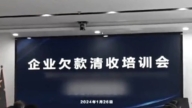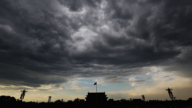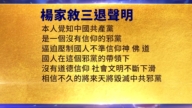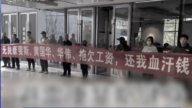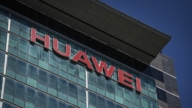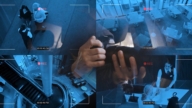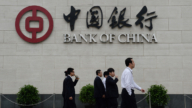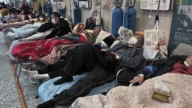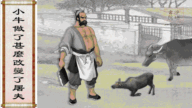【新唐人2011年11月23日讯】近年来,大陆民营企业生存越发艰难。最新一项官方调查显示,超过八成的民营企业家认为税负过重,更有超过三成半说“如果重新选择,不愿再经营企业。”专家指出,中共当局一方面不断盘剥民企,另一方面又压制民企、大肆扶持作为中共党产的国有企业,大陆民企前景堪忧。
这份由“中国民主建国会”(简称“民建”)与中国企业家调查系统,在20号联合发布的《2011年千户民营企业跟踪调查报告》,集中调查了上千名民营企业家。报告显示,超过八成的企业家认为企业税费负担“很重”或“较重”。 23.6%的企业家表示,向各级政府交纳的乱摊派费用超过企业销售收入的“1%以上”,明显高于去年的调查。
对此,政治经济评论家草庵居士表示,现在中国每年的税收增长远远高出GDP增长,税负沉重是事实。
草庵居士:“这些税收哪里来的?在中国(中共)政府的国营企业当中,中石化等三大巨头,它们都是亏损的,利润也不交给政府,它们交的税收也是很少的。所以,在这种情况下,我们就可以得出一个结论,中国大量的税收实际上是来源于私营企业。”
草庵居士认为,大陆民企承担了大量就业,但因为没有官方背景,只能被任意宰割,前景堪忧。
草庵居士:“中国(中共)政府是把这些国有企业看作是自己的亲生儿子,把私人企业看作任意宰割的羔羊。民营企业受到(经济危机)冲击的时候,它还是不忘去加倍盘剥这些民营企业。所以,民营企业在中国的发展,承担的责任会更重,负担也更重,这对中国民营企业的发展是一个很大的伤害。”
这份报告还显示,接近三分之二的民营企业家认同“未来一年国际经济形势将会恶化”,并表示“对市场化改革信心不足。”更有超过三成半的人直言“如果重新选择,不愿再经营企业。”凸显大陆民营企业家们的艰难处境与心态。
2008年全球爆发金融危机,中共当局为刺激经济,向国有企业过度投资而引发资产泡沫。现在,中共被迫实施经济硬着陆,收紧银根,这使08年后处境一直很困难的民营企业雪上加霜,纷纷倒闭。
大陆媒体报导,仅9月25号一天,温州就有9个老板因资金链断裂而“跑路”, 9月27号,一家鞋业老板更因欠债4个亿跳楼自杀。而这一趋势目前还在蔓延,深圳、东莞、义乌、佛山等地也纷纷传出有老板“跑路”、企业倒闭。
纽约城市大学教授陈志飞:“这的确是中国经济发展中,一个原来大家从未想到的一个变数。因为外界普遍认为:中国的企业、中国的运营环境,越来越开放,越来越自由,越来越市场化。但是现在看来,事情是在按照相反的方向发展。”
陈志飞教授强调,国有企业实际上是中共的党产,虽然民企在GDP中曾一度占主导,但中共并不信任民企,而是将资源和资金投向国企。外界调查显示,目前大陆国有化加快,国企又重新占据了经济主导。陈志飞教授还指出,税收其实也是中共压制、控制民营企业的一个手段。
陈志飞教授:“使得民营企业被迫采取各种方式,贿赂啊,或者是打压它的企业职工啊,逼迫民营企业做出一些违背道德、而有利于共党利益的事情。比如说:在镇压法轮功的事情上,逼迫民营企业, 保持跟它(中共)一致,抗拒民营企业工会,等各种方面,它对民营企业都采取这种胁迫的方式。”
据报导,“民主建国会”的这个调查已经持续了8年多。今年的调查涉及不同行业、不同地区、不同规模的企业,问卷都是由企业的法人代表直接填写的。
新唐人记者代静、李谦、肖颜采访报导。
China’s Private Business Not Happy
Private enterprises in China became more difficult
to survive in the recent years.
A latest official survey shows that over 80% of private
entrepreneurs think that the tax burden is too heavy.
Over 35% said, if given a re-choice,
they would not choose to run a business.
Experts point out, Chinese Communist Party (CCP) continues
to exploit the private sector, yet suppressing its development.
In contrast, CCP-controlled state-owned enterprises
are vigorously given various support.
The prospects of China’s private enterprises
might be sorrowful.
China Democratic National Construction Association(CDNCA)
and China’s Entrepreneur Survey Agency jointly issued a
“2011 Follow-Up Survey Report on
1,000 Private Enterprises”.
The report shows that over 80% of entrepreneurs think
the corporate tax burden is “very heavy" or “quite heavy."
Over 23% said that arbitrary charges and fund-raising quotas
levied by the authorities at all levels account for
over 1% of the sales revenue, significantly higher than
last year’s.
Commentator on political and economic issues, Cao’an Jushi,
said China’s annual tax growth is far higher than that of GDP. The heavy tax burden is a fact.
Cao’an Jushi: “Where are these taxes coming from?
The state-owned enterprises, the Big Three, including
Sino-pec Group, are all in the red.
They don’t deliver any profit to the government,
paying very little tax.
So we can conclude that China’s huge amounts
of tax revenue come from the private sector."
Cao’an Jushi believes that China’s private enterprises
create great amounts of jobs.
But due to lack of official background, they could only be
arbitrarily suppressed and exploited by the CCP authorities.
Cao’an Jushi: “China’s (CCP) government treats the state
owned enterprises as its own, the private sector is only considered as their servant.
On top of being hit by the economic crisis, private enterprises
suffer from the double exploitations of the authorities.
Thus in China private enterprises have to take on board more
responsibilities and heavier burdens, which is a great harm to their development.”
The report also reveals that nearly two-thirds of the private
entrepreneurs think “in the coming year, the international economic situation will deteriorate."
They state that they “lack confidence
in the market-oriented reforms."
Over 35% frankly say, “If given a re-choice,
I wouldn’t like to run a business.”
The survey highlights the plight and state of mind
of private entrepreneurs in China.
In order to cope with 2008 global financial crisis, the CCP
stimulated the economy by excessive investments in state-owned enterprises, which led to asset bubbles.
Now, the CCP undertook an economic hard landing,
by tightening the funding.
This caused the worse plight in which private enterprises
have been trapped since 2008, and many businesses failures.
According to China’s media reports, on September 25 alone,
nine Wenzhou-based bosses fled due to lack of cash flow.
On September 27, a shoe factory owner committed suicide,
after becoming indebted for RMB 400 million.
This trend still expands, with more boss-fleeing cases
and business failures in Shenzhen, Dongguan, Yiwu, Foshan and other cities.
Prof. Chen Zhifei (City University of New York): “This is really
an unexpected variable in China’s economic development.
Previously, a general understanding was, China’s enterprises
and business environment will be increasingly open, increasingly free, and more and more market-oriented.
But now it seems that things are heading
in the opposite direction."
Prof. Chen stressed that China’s state-owned enterprises
are actually controlled by the CCP.
Though the private sector was once dominant in GDP,
the CCP authorities did not trust private entrepreneurs.
Instead, they invested resources and capitals overseas.
External surveys show that currently China’s nationalization
is being accelerated.
The state-owned enterprises
regained the economic dominance.
Prof. Chen points out that the tax levy is also a mean
for the CCP to repress and control private enterprises.
Prof. Chen Zhifei: “The CCP authorities forced private
enterprises to take various approaches.
Like paying bribes, suppressing its employees,
doing some unethical things in favor of CCP’s interests.
For example, CCP forced the private enterprises to stay
in line with its suppression of Falun Gong, to resist private enterprise trade unions, etc.
All along, it forces the private enterprises
in such a coercive way.”
CDNCA’s survey was reported to have taken
over eight years to conduct.
2011 survey involves different sectors, regions
and enterprises of different sizes.
All the questionnaires are filled personally
by the enterprises’ legal representatives.
NTD reporters Dai Jing, Li Qian and Xiao Yan


